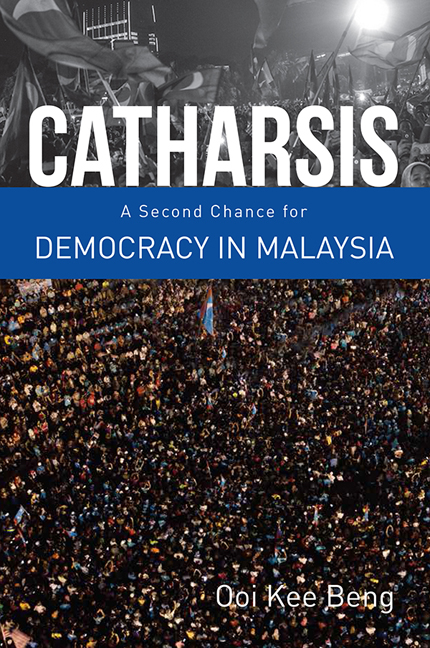Book contents
- Frontmatter
- Contents
- Foreword
- 1 Introduction – Malaysia's Future Is Redeemed
- Before Pakatan Harapan
- Before 9 May 2018
- With Mahathir at the Helm
- Beyond 9 May 2018
- 47 The Bewildering Game of Malaysian Politics, the Rot Within the Barisan Nasional
- 48 A Revolution in Malaysia? Not So Fast…
- 49 Mahathir: Renaissance Man
- 50 Malaysia's Reformasi Movement Lives Up To Its Name
- 51 In Lieu of Race and Religion
- 52 It All Seems So Simple Now…
- 53 Catharsis – The Rebirth of Malaysia Finally Begins
- 54 A Malaysian Spring for Intelligentsia?
- 55 The Layers of Historical Significance of GE14
- About the Author
48 - A Revolution in Malaysia? Not So Fast…
from Beyond 9 May 2018
Published online by Cambridge University Press: 12 February 2019
- Frontmatter
- Contents
- Foreword
- 1 Introduction – Malaysia's Future Is Redeemed
- Before Pakatan Harapan
- Before 9 May 2018
- With Mahathir at the Helm
- Beyond 9 May 2018
- 47 The Bewildering Game of Malaysian Politics, the Rot Within the Barisan Nasional
- 48 A Revolution in Malaysia? Not So Fast…
- 49 Mahathir: Renaissance Man
- 50 Malaysia's Reformasi Movement Lives Up To Its Name
- 51 In Lieu of Race and Religion
- 52 It All Seems So Simple Now…
- 53 Catharsis – The Rebirth of Malaysia Finally Begins
- 54 A Malaysian Spring for Intelligentsia?
- 55 The Layers of Historical Significance of GE14
- About the Author
Summary
Now when it finally happens, it seems to have been inevitable all along and only a matter of time. But let's be honest. It certainly did not feel that way, not even when polling day began. For most Malaysians, toppling the Barisan Nasional (BN) was simply not possible.
BN had after all ruled Malaya/Malaysia since independence. It started out as the Alliance in its first nationwide elections in 1955, expanded to become BN for the 1974 elections and has remained the central power ever since.
And for a large part of that period, Mahathir Mohamad was its president.
It also had the undying loyalty of many in the Malay community, and could count on the over-represented East Malaysian states of Sabah and Sarawak to stay in power at the federal level.
What nobody on Earth could have imagined was that the finally successful attack on the BN would be led by Mahathir himself. In giving credit to him for this historically stunning achievement, one should not for a second diminish the resilience and courage of so many now grouped under the banner of the Pakatan Harapan that now takes on the exciting but daunting task of reforming Malaysia.
These people include most notably Lim Kit Siang, the supremo of the Democratic Action Party (DAP), the only major party that refused to join the BN in the early 1970s. This refusal saw it becoming more and more of a Chinese Malaysian-based organisation over time despite its official ideology of being multicultural. This was a condition that was effectively used against it by BN leaders and a fate that hung like an anchor around its neck for more than four decades. But it survived and could, when the time was ripe, help form the new coalition that now sends BN packing. Lim's political fervour obviously inspired his son, Lim Guan Eng, who was jailed twice by the BN regime but who against all odds, became the frontman for DAP and the chief minister of the rebel state of Penang since 2008.
Then there is Anwar Ibrahim of course, the deputy prime minister sacked and persecuted in 1997–98 by then-prime minister Mahathir. His continued struggle to topple the BN saw him jailed again, and now he watches his coalition triumph from within prison walls.
- Type
- Chapter
- Information
- CatharsisA Second Chance for Democracy in Malaysia, pp. 187 - 190Publisher: ISEAS–Yusof Ishak InstitutePrint publication year: 2018

